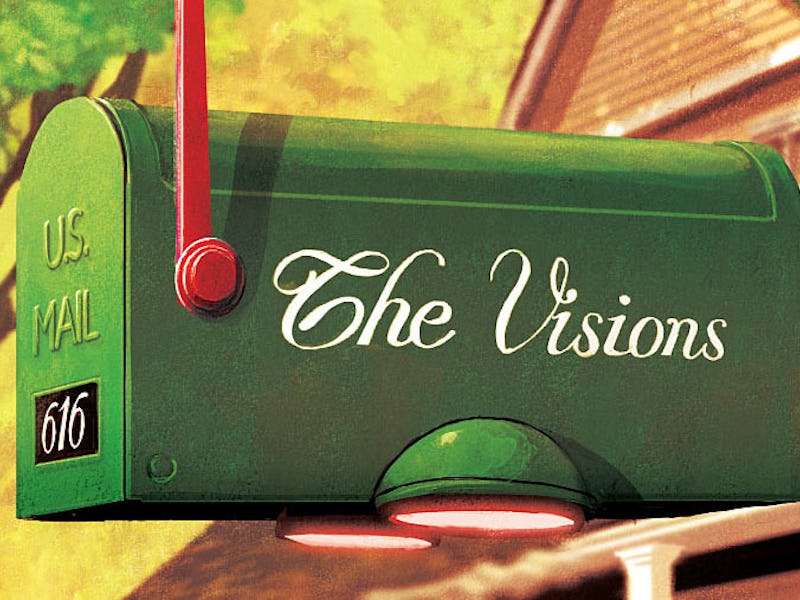Marvel's 'The Vision' is the Most Innovative Comic Currently Running
The Vision is a creepy, poetic meditation on what it means to be a robot. It's a gorgeous science fiction comic.

Movies like Blade Runner or Ex Machina reaffirm the viewer’s humanity by illustrating the experience of “the other,” either a cyborg or a robot. Naturally, viewers engage with these stories from the perspective of its human characters, who look on and sympathize with machines that desperately want to be like us. Cyborg theory is a fantastic, emotive subject for contemporary stories, so we’re excited to see Marvel’s take. Marvel’s The Vision is so unique, so fascinatingly new in the sci-fi canon because it eschews that tradition. That’s also why it’s the best comic out right now.
The Vision, as a character, has been around since 1968. We know his most recent iteration from last year’s Avengers: Age of Ultron when Tony Stark’s A.I. assistant JARVIS is killed then reborn as the humanoid android, the Vision (both played by Paul Bettany). Perhaps capitalizing on the hero’s mainstream debut, Marvel launched a new Vision comic written by Tom King.
The Vision #1
The story follows Vision, away from his Avengers counterpart, in the suburbs of Washington D.C. where he moved to along with his family, a family he created himself. There is his wife, Virginia; daughter, Viv; and son, Vin. All three characters are the family the Vision created for himself so as to get a better understanding of humanity. For the most part, the Visions (as they are called in a family unit) try to assimilate as best they can. The parents have the neighbors over as guests, and the two children go to public school with humans. While Vision’s day job is to act as a liaison between the President of the United States and the Avengers, he is secretly hoping he will be hired by the White House as the Avengers stopped paying wages. There are no world-ending catastrophes, no cameos by the other Avengers. It’s a suburban drama starring a family of robots. Like the first half of American Beauty, but written as a sci-fi film.
The drama quickly veers dark when one day, a supervillain does intrude on the Visions’ home while Mr. Vision is away, and in the midst of attacking Viv and Vin, he is bludgeoned to death by Virginia. No cybernetic powers, or superhero magic. She beats him to death with a pan. The domino effect this has on the family threatens to tear apart the idyllic little suburbia Vision has crafted for himself and his family.
Virginia stops the Grim Reaper
The beauty of stories starring robots, or A.I. programs, or androids is that these stories tend to be examinations on the divide between nature and science, creation vs “creation”, etc. Only by looking at these tragic mechanical creations can we get a glimpse as to what makes our humanity unique. Vision isn’t that kind of story. Instead, it offers the reader a chance to sympathize with the programmed mind of a machine. We are given Vision’s logical perspective throughout the whole book, but we also see the ways in which the emotional fallout and the drama of the events around him force him to illogically change how he reacts to the given situations. We are introduced to Vision as a typical machine, one who favors normality. But as the murder and the blackmail mount, we see him twist those same principals so that he can protect his family. It’s one of the smartest, darkest, most interesting narratives for any book currently in print.
The Vision #3
It’s disturbing. The suburban psychodrama is so strongly established, and so well written that the bursts of violence, superpowers, or even body-horror contrasts so sharply with the rest of the book.
Through it all though, the Visions are given such thoughtful characterizations as to be sympathetic. Not in an Isaac Asimov, I, Robot kind of way, but in way that one sympathizes with any family that has to deal with hardships and struggle. As a family unit, they are charming enough without needing to pass off as human. The tragedy is realizing they can never really be human, and the smartest thing about the book is to have the reader realize that that might not be the best thing for the Visions in the first place.